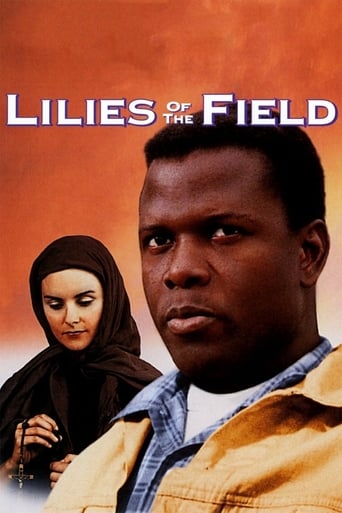

One of the best films i have seen
... View MoreAlthough it has its amusing moments, in eneral the plot does not convince.
... View Moreif their story seems completely bonkers, almost like a feverish work of fiction, you ain't heard nothing yet.
... View MoreIt's a movie as timely as it is provocative and amazingly, for much of its running time, it is weirdly funny.
... View MoreMovies are amazing in the fact that they can offer such a wide range of stories. At least they once did. Complicated political thrillers to horror films to slapstick comedy, all can be found on film. One thing that makes for some joyous moments though it when you take an incredibly simple story and fashion it into a memorable movie. Such is the case with this film.Sidney Poitier stars as Homer Smith, a handyman who stops by a remote farm when his car overheats while he's heading west. Run by a group of Eastern European nuns they are glad to oblige once they get past their language differences. Noticing he's equipped with tools to use, their head Mother Maria Marthe asks him if he could help by fixing their roof. He does so and then spends the night, expecting to be paid the next morning.That doesn't happen when it turns out the nuns have no money to offer. Relying on what they grow and a few items like milk and eggs they get directly from the source, they can't afford anything. Mother Maria puts him off for the time being and convinces him to help with a few more items, staying in return for dinner.Payment doesn't arrive the following day as Mother Maria insists that Smith was sent to them by divine intervention in with the intent of helping them build the church they've been working on for some time now. He argues the point, still insisting as delicately as possible that he needs paid. A battle of wills follows in civil fashion between the two.On Sunday morning he goes with the nuns to a nearby eatery where their weekly services are held from the back of a truck with a priest there to provide for the flock. Going into the restaurant he talks to the owner and learns about the hardships the nuns went through to escape and get to this country. By the time they head back he agrees to at least help them clear the foundation area for the chapel.All of this back and forth carries on throughout the film. It's easy to guess up front if the church will be built or not by the end credits. What makes the story interesting is the fleshing out of the characters and the things that happen on the way there. Smith getting to know the nuns and helping them learn English, his teaching them the gospel tune he grew up with "Amen" which they sing with relish and his growing fondness for them all.The movie is a feel good film with plenty of humor to have you laughing and enough emotional stirrings to play at your heart. There is no political undertones on display here, just the story of a group of people coming together to unite for something good. It's rare to see that these days and nice to be able to experience it here again.Some might not think that being a black and white film it would benefit from a blu-ray release but it does offering the cleanest presentation I've seen of the film. What else could we expect from Twilight Time? Extras include an isolated score track with some effects, a commentary track with film historians Lem Dobbs, Julie Kirgo and Nick Redman and the theatrical trailer. Once again Twilight Time limits their releases to just 3,000 copies so if interested pick up yours today.
... View MoreAn out of work contractor (Sidney Poitier) happens upon an ODD group of nuns. After all, they are five East German nuns in the middle of the Arizona desert! While the nuns have no money and you have no idea why he stays, this Baptist man stays and helps them complete their chapel."Lilies of the Field" is a nice film filled with nice people doing nice things. It can't help but be a movie that people would enjoy, as it has a nice message and nice acting. However, I can't quite see why Sidney Poitier won the Oscar for Best Actor, as the film really didn't seem to take any risks and certainly won't offend. His performance was good but I think he certainly did a lot better, such as in "In the Heat of the Night" or "Edge of the City" or "Pressure Point"--all films which had a much riskier message and required more skill on Poitier's part. Mind you, I liked "Lilies of the Field"--I just didn't feel it was a particularly noteworthy film--though it is a nice family picture.
... View MoreGodsent Homer Smith builds a chapel to five nuns from East Germany.There's the plot in short of this movie.Lillies of the Field (1963) is directed by Ralph Nelson.It's based on the 1962 novel by William Edmund Barrett.Sidney Poitier, who turned 85 last month, gives a terrific performance as Homer.He was the first African American man to win an Oscar.Lilia Skala, who earned a nomination, is superb as Mother Maria.Also great job from other nun performers (Lisa Mann, Isa Crino, Francesca Jarvis and Pamela Branch).Stanley Adams is excellent as Juan.Dan Frazer, who passed away last December at the age of 90, is brilliant as Father Murphy.Director Nelson himself plays the part of Mr. Ashton, and he's great.Jerry Goldsmith is behind the music.I liked this movie.Especially I enjoyed when they started singing "Amen".That Poitier fellow can really sing! This movie leaves you with a nice feeling.
... View MoreWith his car overheating near an Arizona desert, Baptist handyman and ex-serviceman Sidney Poitier (as Homer Smith) stops to ask five Catholic nuns for water. In return, Mr. Poitier helps around the holy house and gives Mother Superior Lilia Skala (as Maria) and the group a lesson in speaking English. Poitier learns the nuns have traveled from East Germany. They believe Poitier was sent from Heaven, to help them build a new chapel. Poitier doesn't think he's up to the task, but God may have other plans This was an understandable favorite when it bowed at the 1963 "Berlin Film Festival" where acting and directing awards were bestowed upon Poitier and Ralph Nelson. The wave of warm-hearted feelings and critical acclaim rode all the way home to the United States, where Poitier won the "Academy Award" for "Best Actor". This was an historical win; after 100 years, a struggle against institutionalized racism was reaching fruition. Poitier is great, although the "Amen" dubbing almost does his performance in...Released during pivotal events in the Civil Rights Movement, "Lilies of the Field" almost startlingly made no political points about race; instead, it paralleled the movement's wise use of religion and non-violence. By speaking softly, the film carried a big stick. This is not a great motion picture (outside of context), but "Lilies of the Field" helped provide many with hope, dignity, and inspiration. Poitier made it to the mountaintop. Climb every mountain, ford every stream, follow every rainbow until you find your dream.******* Lilies of the Field (6/63) Ralph Nelson ~ Sidney Poitier, Lilia Skala, Stanley Adams, Dan Frazer
... View More